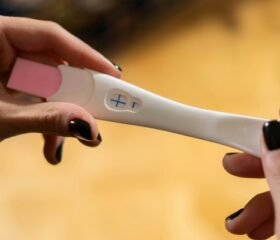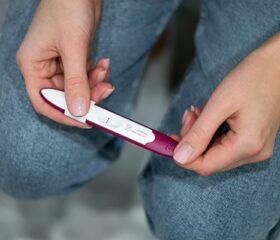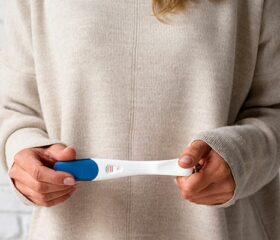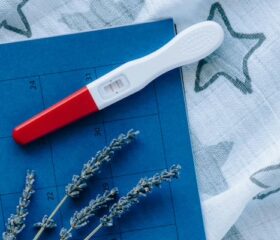When to Take a Pregnancy Test If Your Periods Are Irregular
Waiting to take a pregnancy test can be nerve-wracking, no matter which result you’re hoping for. If your periods are irregular, that will probably only add to your uncertainty.

- Why an irregular cycle makes missing your period an unreliable sign
- When should you take a pregnancy test if your periods are irregular?
- What affects when you can take a pregnancy test?
- How to get accurate results on an at-home pregnancy test
- When you should speak to your doctor about your irregular periods
- How to get pregnant with irregular periods
- Final thoughts
When you can’t use a missed period as a clear sign you might be pregnant, it makes sense if you’re wondering when to take a test.
Let’s take a look at when you should test for pregnancy with irregular periods, other early signs you’re pregnant, and when to get extra help from your doctor.
Why an irregular cycle makes missing your period an unreliable sign
Many women’s menstrual cycles last between 21 and 35 days. Few women’s cycles are perfectly regular—it’s normal for them to vary at least a little within that window—but if you have irregular periods, your cycles may vary quite significantly in length from month to month, and you may even sometimes miss your period entirely.
A missed period is often the first sign of pregnancy that prompts women to take a pregnancy test. However, you obviously won’t get that indication if your cycles are highly irregular.
What causes irregular periods?
Again, it’s normal for menstrual cycles to vary a little in length from time to time. That being said, if you have irregular periods, they may be caused by underlying medical issues or your lifestyle.
Medical issues that can cause irregular periods
When it comes to medical conditions, one of the most common causes of irregular periods is polycystic ovary syndrome (PCOS), which can cause hormonal imbalances (more on this later). 1
Endometriosis, which causes tissue that’s similar to the lining of your uterus to grow elsewhere (e.g., in your fallopian tubes), could also be to blame, along with: 2
- Thyroid issues
- Bleeding disorders
- Certain medications (e.g., blood thinners or steroids)
Your doctor can give you guidance if you suffer from these conditions or are taking medication that disrupts your menstrual cycle.
Lifestyle factors that can cause irregular periods
Overly strenuous exercise or excessive dieting can cause your body fat level to drop too low to support your menstrual cycle. It’s also possible to get irregular cycles due to: 2
- Extreme weight fluctuations
- Stress
- Major changes to your routine
When should you take a pregnancy test if your periods are irregular?
You won’t be able to use the date of your next expected period to determine when to take a pregnancy test. However, there are other ways you can figure out when to test:
Wait the length of your longest cycle
If you’ve been keeping track of your periods (e.g., because you’re trying to figure out when you’re ovulating so you can maximize your chances of conceiving), you could try waiting the length of your longest recorded menstrual cycle before taking a test.
If you don’t remember how long your longest cycle was, try counting 36 days from the date of your last period.
Wait 2–3 weeks after you think you ovulated
If you’re trying to conceive (TTC) and have been tracking your ovulation, either by using ovulation tests, an ovulation calculator, or an ovulation tracker app, you may have a general idea of when you might have ovulated (i.e., when you were most fertile). If so, try waiting 2–3 weeks after you had sex during your suspected fertile window.
Wait until you experience other pregnancy symptoms
Often, your body will give you subtle (or not-so-subtle) clues that you’re pregnant. For instance, many women suffer from breast pain during pregnancy.
While this symptom is shared by premenstrual syndrome (PMS) and pregnancy, if you’re pregnant, your nipples will usually be sensitive, too, whereas PMS tenderness is often limited to simple achiness.
Other early pregnancy symptoms you can watch for include: 3
- Fatigue
- Spotting (implantation bleeding)
- Heightened sense of smell
- Cramping (tends to be less intense than period cramps)
Note that not all women will experience these symptoms, and since some of them are similar to those caused by PMS, a pregnancy test is still the best way to know whether you’re pregnant, even if your periods are irregular. You just might have to wait a little while to take it.
What affects when you can take a pregnancy test?
At-home pregnancy tests work by looking for a hormone called human chorionic gonadotropin (hCG) in your urine. Your body produces it after implantation occurs (when the fertilized egg implants in your uterine lining). 4
After 36 days from the date of your last menstrual period (LMP) or several weeks post-ovulation, your levels of hCG should be high enough to give you an accurate result on your test.
Can you find out earlier if you’re pregnant?
It can be tempting to take a pregnancy test earlier, but if you do, you’re more likely to get a false negative result, even if you actually are pregnant.
This is because your hCG levels are still too low to be detected. Waiting gives your hormone levels time to rise, increasing the accuracy of the test.
If you’re of the mindset that “impatience is a virtue,” you can ask your doctor to perform a blood test. These tests look for hCG in your blood and can give you answers as early as 7–10 days after you conceive—before you would have been due to miss your period, even if you had regular cycles. 5
How to get accurate results on an at-home pregnancy test
Using a pregnancy test isn’t just about taking it at the right time. Make sure to follow the instructions on your test carefully.
You’ll usually either have to collect a sample of your pee and dip the pregnancy test strip in it, or place the test directly in your urine stream. You should test first thing in the morning. That’s because your urine is most concentrated at that time, meaning your hCG levels will be at their highest and easiest to detect.
Drinking a lot of fluids throughout the day can dilute your urine, potentially leading to a false negative if you test later. 6
What to do if you think your test was wrong
If you get a result that you suspect might be a false negative, try:
- Testing again later: If you get a negative result but still suspect you might be pregnant (e.g., you have early pregnancy symptoms), it’s a good idea to repeat the test a few days or a week later.
- Using a digital test: If you want to avoid ambiguous results (i.e., seeing a faint line on your pregnancy test), you can invest in a digital pregnancy test. These often clearly display “pregnant” or “not pregnant,” which eliminates any guesswork on your part.
If you get a positive result, book an appointment with your doctor so you can get started on your all-important prenatal care.
Home pregnancy tests are generally very accurate
At-home pregnancy tests are very accurate (99%) when used correctly and at the right time. 7 However, if you use the test incorrectly or test too early, you may get inaccurate results. If you have any doubts or if you’re getting conflicting results, talk to your doctor.
When you should speak to your doctor about your irregular periods
If you’re trying to conceive with irregular periods, you might need to speak to your doctor or a fertility specialist, especially if:
- Your cycles are “irregularly irregular” (i.e., they’re erratic and inconsistent in length from cycle to cycle)
- You’ve been trying to get pregnant for over a year (or 6 months if you’re over 35) and haven’t had any success
- You have cycles that are consistently longer than 35 days or more frequent than every 21 days (for several consecutive cycles)
As mentioned, certain underlying conditions can cause irregular periods and may even affect your fertility, so it’s important to chat with your doctor about your next steps.
What if your irregular periods are due to PCOS?
While false-positive results on pregnancy tests are extremely rare, PCOS can sometimes cause them. This condition often causes your levels of luteinizing hormone (LH) to be elevated throughout your cycle.
This is why PCOS makes it difficult to track ovulation. Beyond that, because LH’s molecular structure is very similar to that of hCG, pregnancy tests (especially lower-quality ones) sometimes misinterpret LH for hCG. 8
Moreover, some types of ovarian cysts (which PCOS can cause to form) can produce small amounts of hCG. 8
The upshot is that if you have PCOS, you’re significantly more likely than most women to get false-positive pregnancy tests, and may have other fertility issues, too. While you can get pregnant with PCOS, you’ll need to work closely with your doctor or a fertility specialist if you’re trying to conceive.
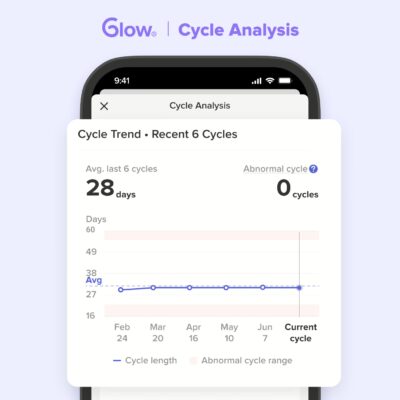
How to get pregnant with irregular periods
Having irregular periods not only makes it more difficult to know when to test, it can also make getting pregnant more difficult since it makes it hard to predict your fertile window each month.
Fortunately, there are strategies you can use to improve your chances of getting pregnant with irregular periods:
Track your ovulation
Tracking ovulation with irregular periods requires a little more work. Ovulation test strips, also known as ovulation predictor kits (OPKs), can be very helpful for those with irregular cycles. They look for an LH surge, which usually happens 16–36 hours before you ovulate. 9
However, if PCOS is causing your irregular periods, your LH levels may peak before you ovulate, which will give you a false positive result. 10 In that case, ovulation tests won’t work for you, but you can still try:
- Basal body temperature (BBT) charting: Your BBT is your body’s resting temperature first thing in the morning. The idea is that when you ovulate, your BBT increases by 1 or 2 degrees Fahrenheit. If you track over a few cycles, you’ll be able to identify patterns that tell you when you’re due to ovulate. However, this method has limited scientific backing and isn’t wholly reliable.
- Monitoring for ovulation discharge: Many women report that their cervical fluid changes when they ovulate. You may find that around ovulation, the consistency of your discharge resembles raw egg whites.
- Looking for other signs of ovulation: Some women also experience ovulation symptoms, such as increased libido, fatigue, or bloating. Getting these isn’t guaranteed, but if you do, you might be in your fertile window.
Other ways to improve your chances of pregnancy
As well as tracking ovulation, you can also take the following steps to keep yourself healthy and increase your chances of conceiving:
- Schedule a preconception visit: Sit down with your doctor before you start actively trying to get pregnant. They can assess any underlying causes your irregular periods have, discuss your overall health with you, and give you guidance on how to increase your chances of conceiving.
- Maintain a healthy lifestyle: As you know, irregular periods can stem from your lifestyle. Make sure you eat a balanced diet, engage in regular, moderate exercise, find healthy ways to cope with stress, and get enough sleep. Not only could these strategies help get your cycle back on track, but they’ll boost your fertility, too.
- Take prenatal vitamins: Prenatal vitamins aren’t just for when you’re pregnant—many experts recommend that you start taking them when you’re trying to conceive. Prenatal vitamins containing folic acid will keep your body healthy and lay the foundation for a healthy pregnancy.
On that note, you may experience nausea or other side effects when you start taking prenatal vitamins. To manage your discomfort, try halving your vitamin and taking each half at different times throughout the day (e.g., taking one in the morning and the other at night).
Final thoughts
While a missed period is often the first sign of pregnancy for many women, having irregular cycles means it won’t work for you.
Still, a pregnancy test is the best way to know for sure whether you’re expecting. If you wait the right amount of time after having sex to take one, you should still get accurate results.
Article Sources
- Johns Hopkins Medicine. "Polycystic Ovary Syndrome (PCOS)" Retrieved June 18, 2025.
- Cleveland Clinic. "Irregular Periods" Retrieved June 18, 2025.
- Johns Hopkins Medicine. "10 Early Signs of Pregnancy" Retrieved June 18, 2025.
- Cleveland Clinic. "Human Chorionic Gonadotropin" Retrieved June 18, 2025.
- Cleveland Clinic. "Pregnancy Tests" Retrieved June 18, 2025.
- University Hospitals. "HCG (Urine)" Retrieved June 18, 2025.
- Planned Parenthood. "Pregnancy Tests" Retrieved June 18, 2025.
- PCOS Weight Loss. "PCOS And False Positive Pregnancy Tests: Causes, Myths, and Solutions" Retrieved June 18, 2025.
- Columbia University Irving Medical Center. "Find Your Ovulation Day" Retrieved June 18, 2025.
- American Pregnancy Association. "How to Use Ovulation Kits & Fertility Monitors" Retrieved June 18, 2025.
